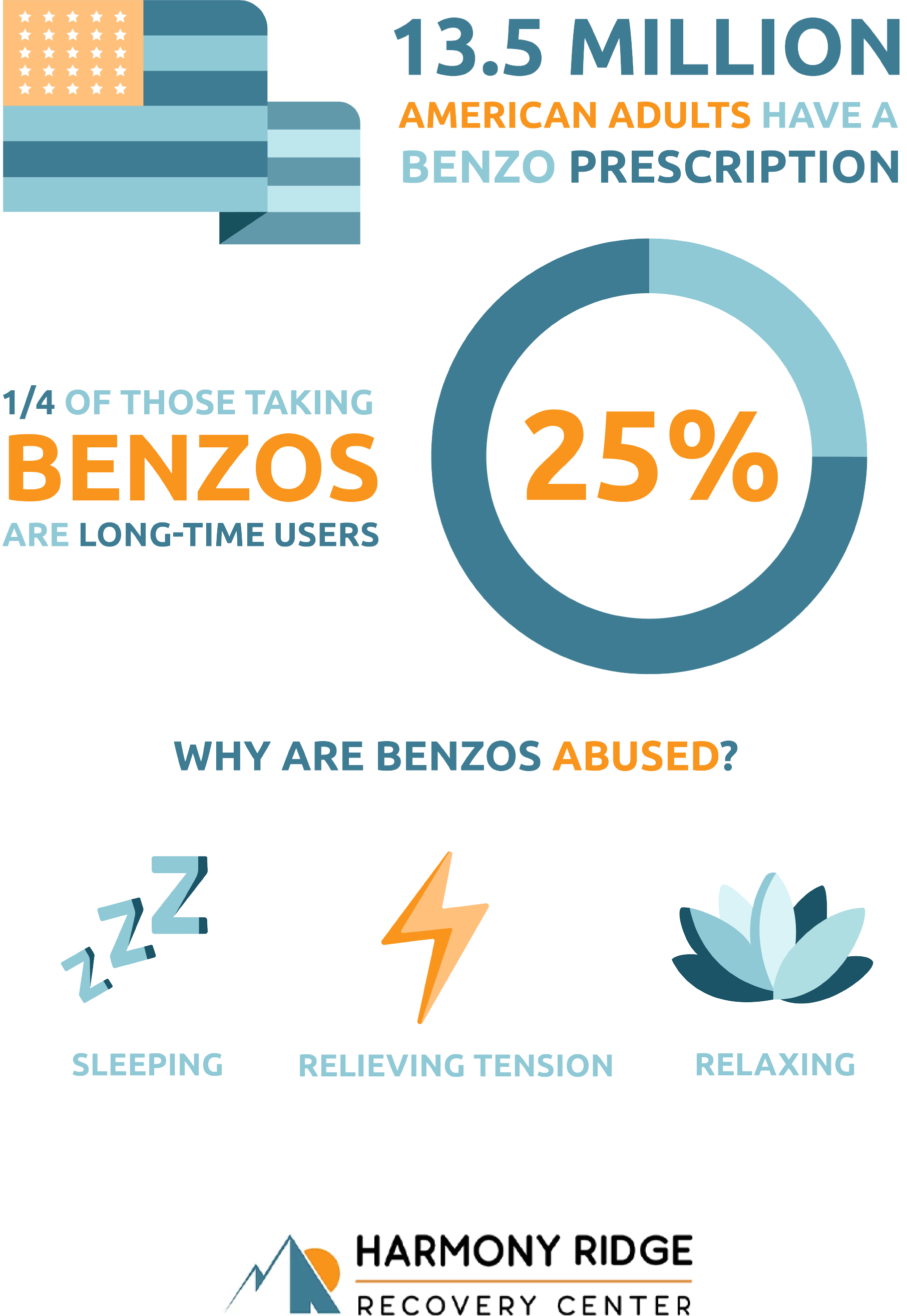Benzodiazepine Addiction: Everything You Need To Know
Take control of your life and break free from benzodiazepine addiction! Harmony Ridge Recovery Center is here to support your journey to recovery.
The line between dependency on medication and addiction to it is a fine one. Unfortunately, it is not uncommon for those who depend on prescription drugs to also become addicted to them. So if your use of benzodiazepines has turned into abuse, know that you are not alone. You can get help at one of the many reputable benzodiazepine rehab centers and go on to live a happier, healthier life. So take the first step toward sobriety today and contact Harmony Ridge Recovery Center to enroll in rehab. We are one of the best drug and alcohol treatment centers in West Virginia that offers benzo addiction rehab. Our door is open 24/7, so you can get the help you need whenever you’re ready.

What are Benzodiazepines?
Benzodiazepines are synthetic substances that mildly depress the central nervous system and cause drowsiness. They are typically used to treat conditions caused by excessive activity in the brain, such as anxiety, seizures, and insomnia. To combat this excessive activity, benzos enhance the effects of gamma-aminobutyric acid (GABA) – a neurotransmitter that slows down the central nervous system. Increasing the effect of GABA through benzodiazepines thus reduces brain activity.
Benzodiazepines are a prescription-only medication. They are most commonly prescribed for the treatment of:
- Insomnia: Benzodiazepines can be used as a short-term treatment for severe insomnia.
- Anxiety and panic attacks: Benzodiazepines are very effective at treating anxiety and panic disorders due to their quick effect.
- Epileptic and non-epileptic seizures: Diazepam and lorazepam can be used to treat seizures in emergencies, while clobazam, clonazepam, and clorazepate help with long-term management of epilepsy; all are benzodiazepines.
- Alcohol withdrawal: Benzodiazepines such as chlordiazepoxide and diazepam can help individuals recover from alcohol dependence by alleviating severe withdrawal symptoms.
The different types of benzodiazepines
There are many different types of benzodiazepines. They vary in how quickly they start working, how long they stay in the body, and what their overall purpose is. The biggest distinction, however, is the half-life. Short-acting benzodiazepines (alprazolam, diazepam, estazolam) affect the brain quickly, have a short half-life, and are quickly metabolized out of the body. Long-acting ones (clonazepam, oxazepam, prazepam, and temazepam) take time to produce desired effects, but those effects last longer due to how slowly the drug metabolizes. Intermideiate-acting benzos (chlordiazepoxide, lorazepam) take longer to act than short-acting ones but don’t last as long as long-acting ones. Each type has its purpose, and different types will often be used to treat different conditions.

The effects of benzodiazepines
By slowing down the activity in the brain, benzodiazepines produce a sense of relaxation and calm. They reduce stress and anxiety, relax muscles, slow heartbeat, and breathing, and cause a sense of drowsiness and sleepiness. This is supposed to help users relax and find it easier to sleep. However, these same effects on a brain that isn’t overstimulated can feel euphoric or can enhance the high of other substances like opioids, heroin, and cocaine. People who abuse benzos to achieve these effects are the ones who should consider seeking help from benzodiazepine rehab centers since prolonged and unnecessary use can cause serious side effects like impaired thinking, memory issues, depression, constipation, and even a coma.
What is a benzodiazepine addiction?
Benzodiazepine addiction is a chronic condition characterized by compulsive use of benzos despite negative consequences. Those struggling with benzo addiction depend on the drug to function normally. Benzo addiction can seriously get in the way of an individual’s life. Their work life, relationships, and overall well-being can all be affected. Without drug addiction treatment in WV, benzodiazepine addiction will worsen over time. This can consequently lead to permanent health issues and severe burdens like financial debt. To prevent this, it is paramount that you go into benzo rehab as soon as you realize you have a problem.
The impact of benzodiazepine addiction on mental health
Benzodiazepine abuse can take a significant toll on mental health. Although the drugs are prescribed as a way to alleviate mental health issues, the opposite can end up occurring. Misuse can lead not only to addiction but also problems in overall well-being.
In certain cases, people will experience anxiety or insomnia when they stop using benzodiazepines. Another effect that misuse of benzodiazepines can have is “emotional anesthesia” – an emotionally numb state. In other words, people lose the ability to feel a significant number of emotions. In addition, studies have shown that chronic, high levels of benzodiazepine use can lead to depression. Some people may also become depressed during the withdrawal process. Mood instability like this is a possible outcome of benzodiazepine use that must be taken seriously.

A big part of benzo addiction treatment is addressing the mental health issues caused by substance abuse in addiction therapy. During your therapy sessions, you will try to overcome the effects of benzo addiction on your psyche whenever possible and learn to cope with whatever symptoms remain.
Benzodiazepine abuse statistics in the United States
Benzodiazepines are a Schedule IV controlled substance, meaning they have a comparatively low chance of causing addiction. However, they are among the most commonly prescribed medications in the United States. About 12.5% of adults in the US use them; this translates to an estimated 30.5 million people. Among these, 25% are long-term users, and 17.1% misuse the medication they are on. Although addiction rates are relatively low – only around 2% of users develop a benzodiazepine use disorder – the risks remain high. Benzodiazepine use has been linked to emergency room visits, mental disorders, suicidal ideation, and abuse of other substances. Between the sheer number of people who have benzodiazepine prescriptions and the thin line between misuse and addiction, hundreds of thousands of people are at risk of needing benzo rehab every year.
The majority of benzos are legally prescribed and obtained. Addiction typically develops slowly as tolerance to benzos increases over time. Users then gradually increase their dosage to dangerous levels. Prolonged misuse then chemically alters the brain, causing a dependency when the drug is no longer being used. When the substance is no longer present in sufficient amounts, withdrawal begins to occur. Withdrawing from benzos can result in mood swings, nausea, weight loss, headaches, muscle pain, hallucinations, and more.
Fortunately, reputable benzodiazepine rehab centers are available in West Virginia, and you can seek help if you need it. With proper benzodiazepine addiction treatment, you can successfully recover from this addiction and regain control of your life.
Signs that you may need benzo rehab
Signs of a benzo addiction range from physical to behavioral. Look for them in yourself or loved ones who are using benzodiazepines because recognizing the signs of benzodiazepine addiction is key to preventing it from worsening.
Benzodiazepine addiction can be recognized through physical and physiological signs such as:
- physical weakness
- confusion, memory loss, and slurred or incoherent speech
- impaired thinking, poor decision-making abilities, and poor judgment
- blurred vision and dizziness
- lack of motor coordination
- drowsiness and excessive sleeping
- slow or labored breathing
- drug-induced coma

Behavioral clues of benzodiazepine addiction include:
- withdrawal from friends, family, and responsibilities
- strange financial habits such as borrowing money, stealing, draining bank accounts, or maxing out credit cards
- risky behavior, such as driving under the influence
- reduction in effort to maintain hygiene
- uncharacteristic and unpredictable changes in mood
Chronic abuse of benzodiazepines may also result in other physical and mental health issues, such as anorexia, insomnia, anxiety, depression, and chronic headaches. While the majority of physical issues will go away after benzo detox, and you’ll deal with many of the behavioral problems in benzo rehab, the disorders you develop due to addiction may be more long-lasting.
Withdrawal from benzodiazepines
How withdrawal from benzodiazepines looks will vary from person to person. The exact symptoms one experiences and for how long is dependent upon multiple factors. The severity of addiction and length of use are chief among them. However, for most people, the benzo withdrawal will look like this:
- 6-8 hours after last use. The first signs of withdrawal begin. This generally includes anxiety and insomnia.
- Days 1-4. Rebound anxiety and insomnia peak after a couple of days. During days one through four, severe discomfort from insomnia and increased anxiety tend to occur.
- Days 5-14. The symptoms of withdrawal will generally be felt for at least 10-14 days before fading away entirely.
- Days 15+. Those with chronic addictions may experience post-acute withdrawal symptoms, also referred to as PAWS. These are random periods of sharp withdrawal symptoms weeks or months after ending benzodiazepine use.
The most common symptoms of benzodiazepine withdrawal are nausea, anxiety, tremors, sweating, headaches, heart palpitations, muscle pain, and seizures. While these symptoms may appear mild compared to what one experiences during withdrawal from other substances, it is still recommended to undergo benzo detox at one of the benzodiazepine rehab centers in the area that has a fully equipped medical detox center WV. This ensures your safety and comfort during the detox process.
Benzo addiction treatment at Harmony Ridge Recovery Center for a better and healthier life
Fortunately, benzodiazepine addiction treatment is an option at a recovery center such as ours. Through evidence-based therapy and care provided in our benzo rehab, recovery becomes possible. Regardless of the severity of your addiction to benzos, we have a program that can help as we treat benzodiazepine addiction at several different levels of care.
Inpatient treatment programs
For the most severe cases of benzodiazepine addiction, our residential treatment center in West Virginia is the perfect place for benzo detox and rehab. Residential treatment, also known as inpatient rehab, is the highest level of intensive care for recovering individuals. Those who enroll in residential treatment will reside at our facility 24/7.

As a participant in our inpatient program, you’ll take part in a structured daily routine full of treatment services each day. These services include a combination of different therapies, support groups, holistic treatment, as well as medical care. Inpatient treatment generally runs between 28 and 90 days. It is typically followed by an outpatient program.
Partial hospitalization programs
After the inpatient rehab, you may want to consider a partial hospitalization program West Virginia. A partial hospitalization program (PHP) is a step down from inpatient rehabilitation. Participants in PHPs will spend 4-6 hours a day, 3-5 days a week, in benzodiazepine rehab centers. This program offers more flexibility than inpatient treatment. However, it requires more commitment than standard outpatient programs. This makes it an effective transitional step between the two.
Outpatient treatment programs
Outpatient treatment offers the most flexibility out of all the levels of care. Recovering individuals are able to create their own schedules based on their needs. Outpatient treatment includes many of the same services that the more intensive programs offer. The main difference is the level of commitment.
In inpatient programs, you’re spending 24 hours a day at our facility; a PHP provides 15-30 weekly hours of treatment. This is more than the 10-15 weekly hours of therapy you’ll receive in our intensive outpatient program in West Virginia. That isn’t necessarily a drawback. In fact, many people in recovery prefer to have the freedom to spend time with friends and family and do the things they love. However, it does make IOPs more suitable for later stages of benzo rehab, when you already have the confidence to maintain your sobriety independently, and milder cases of addiction that don’t require as much support during recovery.
Addiction aftercare
The right benzo addiction treatment won’t just help you while it lasts; instead, it’ll prepare you for maintaining your sobriety after rehab too. Not sure you can stay on the road to recovery independently? Don’t worry – we will ease your transition into everyday life with our aftercare plans.
Addiction aftercare looks different for everyone. That is why you will work with your therapist and case manager to create a unique personalized plan suited to your needs. You may want to continue therapy after rehab or join a 12-step program. Research shows that planning for aftercare positively impacts long-term sobriety and increases the chances of successful recovery.
Harmony Ridge Recovery Center offers holistic benzo addiction treatment
Benzodiazepine addiction can affect you physically, mentally, emotionally, and even spiritually. Successful benzo rehab must, therefore, also address all aspects of your life touched by addiction. Such a holistic approach to every step of the treatment increases the chances of long-term recovery. That is why Harmony Ridge provides everything you need to leave addiction behind, from safe detox to different types of therapy to a comfortable and encouraging atmosphere.

Safe detox under medical supervision
Although the symptoms of benzodiazepine withdrawal are typically not life-threatening, going through benzo detox without medical supervision can be dangerous. Depending on the length and severity of the addiction, withdrawal can be quite uncomfortable. Quitting cold-turkey further increases the chances of bad withdrawal symptoms. The most dangerous of those are serious suicidal ideation and grand-mal seizures, which can cause injuries. Instead of risking those, consider our detox center, where you can easily access medication-assisted treatment and other medical help as needed.
Therapy for benzo addiction and co-occurring disorders
The majority of your time in benzo rehab will be spent in therapy. This is where you will take a closer look at what caused your addiction, what triggers your substance abuse, and how you can change your behavior. There are two main therapeutic methods for this:
- Dialectical behavior therapy for addiction that aims to uncover bad habits and encourage behavioral changes through conversation
- CBT treatment plan for substance abuse that identifies disordered thinking patterns, raises awareness about them, and teaches you how to break them
While these approaches to therapy are the most widespread in rehab due to their effectiveness in treating addiction, they don’t work for everyone. For this reason, Harmony Ridge also offers other types of therapy, such as:
- family therapy for addiction to help you reconnect with your family members and mend important relationships
- art therapy for addiction where you can express your feelings creatively
- rational emotive behavior therapy which teaches you to rationally examine how your emotions and thoughts affect your behavior
- motivational interviewing that aims to help you find the motivation to recover
- holistic therapy for addiction which combines therapy with nutrition, physical activity, and spirituality to provide the most all-encompassing treatment for addiction
Co-occurring disorders commonly treated in benzodiazepine rehab centers
Co-occurring disorders are defined by the presence of both an addiction and mental health disorder. If co-occurring disorders are present, dual diagnosis treatment is necessary. Since benzodiazepines are often prescribed for those already suffering from mental health issues, it is not uncommon for people in benzo addiction treatment to have a co-occurring disorder such as depression, anxiety, PTSD, or other substance use disorders.
A comfortable facility in a peaceful environment
In addition to medical and mental health services, Harmony Ridge can offer you something that most benzodiazepine rehab centers can’t – a modern and well-equipped facility in a stunning location that facilitates recovery. Not only will you attend treatment in a comfortable recovery center, but you will also be surrounded by breathtaking nature that you can explore in your free time.

Caring and compassionate experts
Our biggest asset is our team of medical professionals, mental health experts, and addiction specialists. Benzo addiction treatment is, after all, administered by someone, so it’s important to have the right someone available. We are proud to say that all our staff consists of accredited professionals with experience in the field of addiction treatment. Furthermore, everyone you’ll meet has personally been affected by addiction – they may even be in recovery themselves. So we all know very well how devastating addiction can be. That is why we are here to support you, not judge or discriminate. You’ll be safe and comfortable in our care.
Regain control of your life with West Virginia's top benzodiazepine rehab center
The Harmony Ridge Recovery Center team is 100% committed to your long-term recovery. It’s our goal for every patient to feel safe, secure, and welcome during their time with us and to leave our program confident in their sobriety. But before we can help you with a personalized treatment plan, you must first reach out and ask for help. Remember: seeking help from benzodiazepine rehab centers is the first step in recovering from benzodiazepine addiction. So contact us today. We can help you get started on your journey toward recovery.
FAQ
1. What are benzodiazepines?
Benzodiazepines are synthetic drugs that depress the central nervous system by enhancing the effects of a neurotransmitter that slows down brain activity. They are controlled substances with medical use and are typically prescribed for anxiety, insomnia, seizures, or alcohol withdrawal.
2. What are the effects of benzodiazepines?
Benzos slow down breathing, heart rate, and brain activity. This produces a sense of relaxation and calm, as well as makes the user feel drowsy and sleepy.
3. What are the dangers of benzodiazepine abuse?
Over time, users develop a tolerance to benzodiazepines. They then need higher doses in order to achieve the same effects and become dependent on taking the medications. But prolonged use can cause problems with physical and mental health. Benzo abuse can lead to insomnia, memory issues, impaired thinking, sleepiness, and even coma.
4. What are the symptoms of benzodiazepine withdrawal?
During detox, you are likely to experience the following symptoms of withdrawal: nausea, anxiety, tremors, sweating, headaches, heart palpitations, muscle pain, and seizures. Some of these can be extremely painful and even dangerous, especially if you are not under medical supervision.
5. How long does it take to detox and recover from benzodiazepine addiction?
Detoxing from benzos typically takes about two weeks; the symptoms of withdrawal peak around day 4. Full recovery, however, can take much longer. How much time you need in rehab will depend on the severity of your addiction, the dosage you have been taking, your mental health, the presence of a support system, and other factors.
References:
https://www.mayoclinic.org/diseases-conditions/drug-addiction/symptoms-causes/syc-20365112
Jump To Section
Begin Your Journey to Healing Here
Ask me about recovery, I can help you!
Our recovery specialists are standing by 24/7 to help you or your loved one.
Or call us: 



